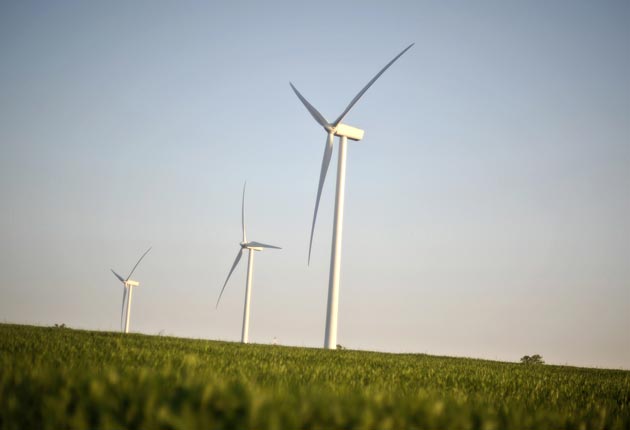Councils to sell electricity to the national grid in green initiative

Town halls could become mini power stations under plans to allow councils to sell "green electricity" to the national grid.
The scheme is designed to give local authorities a financial incentive to invest in wind turbines, solar panels and other forms of renewable energy. The cash raised could be channelled back into frontline services or used to limit council tax increases.
Chris Huhne, the Energy and Climate Change Secretary, is preparing to overturn a 34-year-old ban on councils supplying electricity from small-scale green schemes into the grid.
It will be hailed by the Government as a further step towards hitting targets for reducing Britain's CO2 emissions by one-third by 2020.
Solar panels fitted to an average-sized town hall building could raise £10,000 a year for a local authority, while a large stand-alone wind turbine could generate electricity worth hundreds of thousands of pounds.
Councils in coastal areas could invest in wave power schemes, while those on major estuaries could attempt to generate electricity from the movement of the tides.
Others could invest in anaerobic digestion, a process used to treat waste water, which as a by-product releases gases suitable for energy production.
The move was welcomed by the Local Government Association as a "victory for councils who want to transform the way we provide cheap and green power for millions of people".
Gary Porter, the chairman of its environment board, said: "Town halls across the country are desperate to install solar panels and other renewable energy measures on millions of homes, offices, leisure centres and other council buildings.
"This has the potential to revolutionise the way we produce electricity by turning town halls into green power stations. This could save huge amounts of money to help maintain services in these difficult financial times and keep council tax down."
Several councils have developed renewable energy systems, generating more than 600,000kWh of wind or solar power a year. But the Local Government Act of 1976 prohibits authorities in England and Wales from selling electricity not produced alongside heat.
The rule – which Mr Huhne has denounced as "frankly ridiculous" – was brought in to protect emerging private electricity companies. It effectively bans the sale to the national grid of energy from renewable sources.
The ban is to be overturned later this month. It would free them to supply the grid – either at feed-in tariff rates or at higher commercial rates. Councils that apply would still need to gain licences through Ofgem, the gas and electricity regulator.
The Renewable Energy Association commented: "This move will allow councils to take a central role in greening the nation."
The initiative follows Government proposals to offer cash incentives to communities to take part ownership of renewable energy projects.
A Government source said: "The idea of the policy is to realise the potential that smaller-scale generation and local effort has in helping meet targets alongside big scale investment."
Further details are due to be announced by Mr Huhne next week.
Ministers are preparing an Energy Bill to be introduced in the autumn which they say is designed to make it easier for home-owners and businesses to save energy, reduce emissions and cut their bills.
Join our commenting forum
Join thought-provoking conversations, follow other Independent readers and see their replies
Comments